六年级上册重点句型
- 格式:doc
- 大小:27.50 KB
- 文档页数:3

人教版六年级上册语文句型知识点(1-8单元)【篇一】人教版六年级上册语文句型知识点:第一单元1.比喻句:(1)像一曲无字的歌谣,神奇地从四面八方飘然而起,逐渐清晰起来,响亮起来,由远而近,由远而近……(2)雨声里,山中的每一块岩石、每一片树叶、每一丛绿草,都变成了奇妙无比的琴键。
2.拟人句:(1)飘飘洒洒的雨丝是无数轻捷柔软的手指,弹奏出一首又一首优雅的小曲,每一个音符都带着幻想的色彩。
(2)风,也屏住了呼吸,山中一下子变得非常幽静。
第3课草虫的村落1.拟人句:它们意味深长地对视良久,然后一齐欢跃地走回洞穴里去。
2.比喻句:在这些粗壮的黑甲虫中间,它们好像南国的少女,逗得多少虫子驻足痴望。
3.连动句:我看见在许多同类虫子中间,一只娇小的从洞里跑出来迎接远归者。
4.“把”字句:直至夕阳亲吻着西山的时候,红鸠鸟的歌声才把我的心灵唤回来。
第4课索溪峪的“野”1.拟人、比喻句:索溪像一个从深山中蹦跳而出的野孩子,一会儿绕着山奔跑,一会儿撅着*,赌着气又自个儿闹去了。
2.排比、拟人句:这种美,是一种惊险的美;这种美,是一种磅礴的美;这种美,是一种随心所欲、不拘一格的美……3.比喻句:相对相依,宛如“热恋情人”;婷婷玉立,则好似“窈窕淑女”。
【篇二】人教版六年级上册语文句型知识点:第二单元第5课詹天佑1.关联词:这是中国人自己修筑的第一条铁路,一定要把它修好;否则,(不但)惹那些外国人讥笑,(还)会使中国的工程师失掉信心。
(递进关系)2.设问句:火车怎样才能爬上这样的陡坡呢?詹天佑顺着山势,设计了一种“人”字形线路。
3.排比句:哪里要开山,哪里要架桥,哪里要把陡坡铲平,哪里要把弯度改小,都要经过勘测,进行周密计算。
第6课怀念母亲1.关联词:我想到故乡,故乡的老朋友,心里有点酸酸的,有点凄凉。
(然而)这凄凉并不同普通的凄凉一样。
(转折关系)2.反问句:连一个清清楚楚的梦都不给我吗?【篇三】人教版六年级上册语文句型知识点:第三单元第10课别饿坏了那匹马1.关联词:(如果)没有他每天早上这宽厚的一笑,我(就)不会继续白看他的书,也就不会有那刻骨铭心的两个耳光。
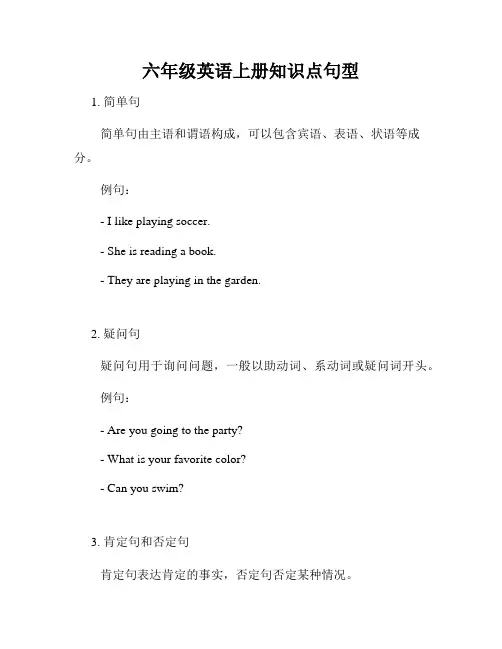
六年级英语上册知识点句型1. 简单句简单句由主语和谓语构成,可以包含宾语、表语、状语等成分。
例句:- I like playing soccer.- She is reading a book.- They are playing in the garden.2. 疑问句疑问句用于询问问题,一般以助动词、系动词或疑问词开头。
例句:- Are you going to the party?- What is your favorite color?- Can you swim?3. 肯定句和否定句肯定句表达肯定的事实,否定句否定某种情况。
例句:- She can play the piano. (肯定句)- I don't like spicy food. (否定句)- They have finished their homework. (肯定句)4. 情态动词情态动词用来表示说话人的意愿、可能性、能力等情态。
例句:- You should apologize to your friend.- They might arrive late.- We can't go to the park today.5. There be句型There be句型用于描述某地有某物或发生某事。
例句:- There is a cat on the roof.- There are many books on the shelf.- There was a big earthquake last night.6. 系动词系动词用于连接主语和表语。
例句:- She looks happy.- The flowers smell sweet.- The soup tastes delicious.7. 复合句复合句由一个主句和一个或多个从句构成。
例句:- She is reading a book that her teacher recommended. (定语从句) - I will call you when I arrive home. (时间状语从句)- He can't go to the party because he is sick. (原因状语从句)8. 并列句并列句由两个或多个相互独立的句子组成,用逗号、分号或连词连接。
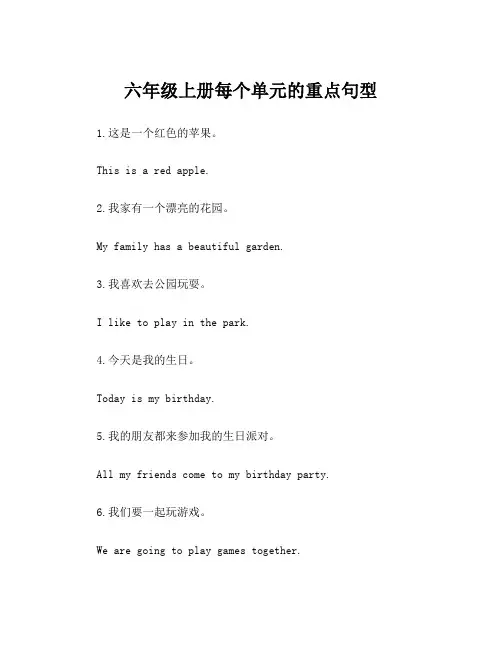
六年级上册每个单元的重点句型1.这是一个红色的苹果。
This is a red apple.2.我家有一个漂亮的花园。
My family has a beautiful garden.3.我喜欢去公园玩耍。
I like to play in the park.4.今天是我的生日。
Today is my birthday.5.我的朋友都来参加我的生日派对。
All my friends come to my birthday party.6.我们要一起玩游戏。
We are going to play games together.7.他们正在做运动。
They are doing exercises.8.我想要一杯冰水。
I would like a glass of cold water.9.他们正在做作业。
They are doing their homework.10.爸爸在做饭。
Dad is cooking.11.我们正等着上课。
We are waiting for the class to start.12.妈妈在整理厨房。
Mom is cleaning up the kitchen.13.我们应该多爱护环境。
We should take care of the environment more.14.我们要保护野生动物。
We need to protect wildlife.15.我喜欢读书和画画。
I like reading and drawing.16.我每天都去学校上课。
I go to school and attend classes every day.17.我会和朋友一起做手工。
I will do handicrafts with my friends.18.我们一起去骑自行车吧。
Let's go cycling together.19.我要去图书馆借书。
I will go to the library to borrow books.20.我们应该学会如何做一名优秀的学生。
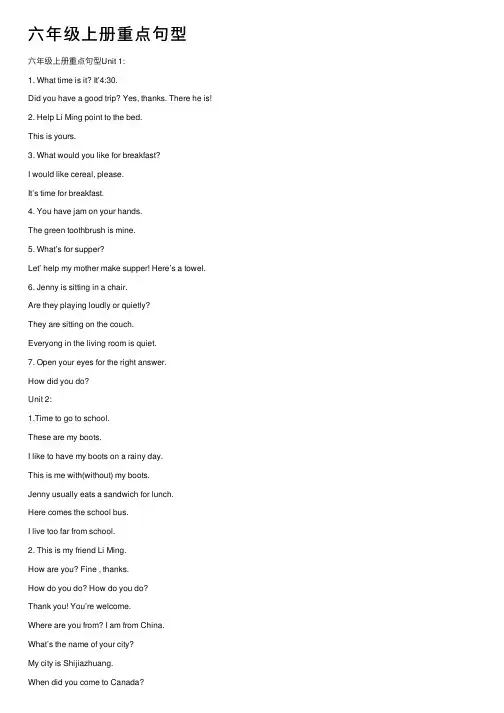
六年级上册重点句型六年级上册重点句型Unit 1:1. What time is it? It’4:30.Did you have a good trip? Yes, thanks. There he is!2. Help Li Ming point to the bed.This is yours.3. What would you like for breakfast?I would like cereal, please.It’s time for breakfast.4. You have jam on your hands.The green toothbrush is mine.5. What’s for supper?Let’ help my mother make supper! Here’s a towel.6. Jenny is sitting in a chair.Are they playing loudly or quietly?They are sitting on the couch.Everyong in the living room is quiet.7. Open your eyes for the right answer.How did you do?Unit 2:1.Time to go to school.These are my boots.I like to have my boots on a rainy day.This is me with(without) my boots.Jenny usually eats a sandwich for lunch.Here comes the school bus.I live too far from school.2. This is my friend Li Ming.How are you? Fine , thanks.How do you do? How do you do?Thank you! You’re welcome.Where are you from? I am from China.What’s the name of your city?My city is Shijiazhuang.When did you come to Canada?I came on Monday.You spead good English.Does everyone in your family speak English? How old are you? I’m twelve years old.2.Let’s get to work.How’s the weather today?What’s the weather like today?Wht’s the temperature outside?It’ fifteen degrees.How many lines make a triangle?hat’ your favourite shape?My favourite shape is a circle.I like all the shapes.4. These words get bigger with an es at the end. Men, women and children are people.5. Do you always do your homework?Let’s put a triangle always.6. Who wants to learn a new song?I love to sing.Would you play the piano?I want everyone to sing loudly.Unit 3:1.How many seasons are there in a year? There are four seasons in a year.The flowers bloom.What a hot, sunny day!The wind blows the leaves off the trees.I don’t like to get wet.What do you wear in winter?Different clothes for different seasons.2.What a cold , snowy day!What do you like to do in winter?Can you teach me?3.He’s always hot or cold.I want to go outside to play in the snow.4. Do you know what a snowman is?This one is smaller than the first.5.Danny has a pair of skates for Li Ming.Li Ming puts them on.You learn fast.6.What’s your favourite season?I like to ski on the snow.I like to splash in the rain.I like to sit in the sun.Unit 4:1.It’s a Western holiday.He is a merry man in red clothes.They bring gifts for us.Christmas songs are carols.2.Let’s find the card with Santa.3.What do you want to buy?I want to buy something for my family for Christmas.I am going to give them something special from China for their Christmas tree.What would you like for Christmas?4.Where does the star go?Let’s invite Danny to help us put up the tree. It’s fun to put up a Christmas tree.Let’s put our gifts under the tree.The star always goes on top.5.Many people say he was the son of God.He taught people to love God and to love each other.When the baby grew into a man , he was a great teacher.6.Let’s go and see.He did bring gifts.Jenny whispers to Li Ming.It has he name on it.This is for you, It’s from Santa.Would you like some pop?Yes, please./ No , thanks.重点短语September first 九⽉⼀⽇come in 进来living room 客厅wash dishes 洗盘⼦on Monday 在星期⼀make supper 做晚饭Good work ⼲得好dry the dishes 擦⼲盘⼦watch TV 看电视sit in a chair 坐在椅⼦上sit on the couch 坐在沙发上writing a letter 写信on a rainy day 在⼀个下⾬天school bus 校车bus driver 公交司机speak good English 英语说得好get to work 开始学习make a triangle 构成⼀个三⾓形in the blanks 在空格⾥have lunch 吃午饭on Saturdays 在每个周六play the guitar 弹吉他get wet 被淋湿ski on the snow 滑雪go outside 出去go inside 进去make snowmen 堆雪⼈a big ball of snow ⼀个⼤雪球throw snowball 打雪⼈a pair of skates ⼀双溜冰鞋turn around 转圈walk forwards 向前⾛sit in the sun 坐在阳光下a Western holiday ⼀个西⽅的节⽇go to school 去上学Christmas tree 圣诞树Christmas lights 圣诞灯a merry man in red clothes ⼀个穿着红⾐服的快乐的⼈Merry Christmas 圣诞快乐department store 百货商店something special 特殊的东西put up 装点see you soon 不久见one day 有⼀天long ago 从前the son of God 上帝的⼉⼦shone in the sky 在天空中闪烁grow into a man 长⼤成⼈help each other 互相帮助whisper to 悄悄对…说something Chinese 中国的东西重点词形month(复数)monthsfamily(复数)familiesI’ll (完形)I willYour(名物代)yoursmy(名物代)minewash(三单)washes toothbrush(复数)toothbrushes dirty(反义词)cleanhave(三单)hasmeet(同⾳词)meatdish(复数)dishescouch(复数)couchesloud(副词)loudlyquiet(反义词)loudlive(现分)livingopen(反义词)closerighy(反义词)wrongrain(形容词)rainywear(同⾳词)wheresun(形容词)sunnybus(复数)buseswith(反义词)withoutdry(反义词)wetbicycle(同义词)bikeMr.(对应词)Mrs.)far(反义词)nearcome(过去时)camesame(反义词)different south(反义词)northoutside(反义词)insideman(复数)menwoman(复数)womenchild(复数)childrenpeople(复数)peoplethis(反义词)thatdress(复数)dresses tooth(复数)teethwill(过去时)wouldshall(过去式)shouldsoft(副词)softlyleaf(复数)leavesmittens(同义词)mitts nine(序数词)ninthskate(名词)skatesforget(过去式)forgot snowman(复数)snowmen big(⽐较级)biggerfast(副词)fastski(现分)skiingwest(形容词)western holiday(复数)holidays take(现分)takinggift(复数)giftswrite(同⾳词)writing bring(现分)bringing bring(过去式)brought shop(现分)shopping will not(缩写) won’ttoy(复数)toysdo(三单)doesbaby(复数)babiesknow(过去式)knewshine(过去式)shone teach(反义词)learnour(宾格)usgrow(过去式)grewso(同义词)veryfor(同⾳词)four重点单词Aunt阿姨 uncle叔叔cousin表兄妹glasses眼镜gray灰⾊ Canada加拿⼤Australia澳⼤利亚U.K.英国China 中国 U.S.美国Capital⾸都 city城市Country国家 map地图Chinese 中国的English英语Know知道 speak说话North北 south南east东 west西airplane(plane). 飞机hotel旅馆 train⽕车trip旅⾏ arrive到达come来 go去leave离开 fast快的slow 慢的faster⽐较快slower ⽐较慢clothes⾐物 jacket 夹克ticket 票 jump跳run跑 walk步⾏sit坐 stand站this这 that那these这些 those那些from to 从…到…baby婴⼉ man男⼈woman⼥⼈ draw画look看 point指see看见 sleep睡觉now现在 quick快的loud⼤声的 quiet安静的some⼀些camera相机children孩⼦们men男⼈们people⼈们picture图⽚women⼥⼈们easy容易的hard难的many许多 everyone每个⼈help帮助 hurt 弄伤loudly⼤声地 quickly快地quietly安静地slowly慢地bottom底部computer电脑corner⾓落e-mail电⼦邮件envelope信封left左letter信 postcard明信⽚right右 stamp邮票top顶部 send寄gift礼物bathroom浴室 bathtub浴缸dishes盘⼦ kitchen厨房refrigerator冰箱 room房间shower 淋浴sink洗涤槽stove炉灶 toilet马桶clean⼲净的 dirty 脏的cook烹调 dry⼲的wash洗 wet湿的mine 我的yours你的,你们的always总是,⼀直never从来不sometimes有时usually通常 boots靴⼦circle圆 line直线shape形状 square正⽅形triangle三⾓形umbrella⾬伞fall秋天 ice冰mittens(mitts). 连指⼿套rain⾬.scarf围⼱Snow雪 spring春天summer 夏天 sun 太阳wind风 winter冬天learn学 skate溜冰ski滑雪 teach教think认为 put on穿上take off脱掉card卡⽚Christmas圣诞节holiday节⽇ lights灯santa圣诞⽼⼈something某物 song歌曲star星星 thing东西toys玩具 special特殊的today今天 tomorrow明天Yesterday昨天any⼀些 heavy重的light轻的 basketball篮球game⽐赛 player运动员runners运动鞋 shorts短裤sport运动 team球队T-shirt T恤catch接hit打 lose输need需要 throw投win赢 or或者after 在…之后before在…之前bones⾻骼 cabbage⼤⽩菜day 天 exercise锻炼face脸 homework作业hours⼩时 minutes分钟months⽉份muscles肌⾁onions洋葱peas⼤⾖skin⽪肤 teeth⽛齿weeks星期 brush刷comb梳理 healthy健康的sick有病的 high⾼的low低的 strong强壮的weak虚弱的someone某⼈beach沙滩 cloud.云flowers.花 grass草Leaves树叶 ocean海洋Park公园 sand沙⼦Sandals凉鞋 sky天空swimming pool游泳池swimsuit 游泳⾐fly飞 lie躺skip跳绳 swim游泳will 将要 very⾮常begin开始 forget忘记remember记得cake蛋糕 cookies⼩甜饼flag旗 late迟的ice cream冰激凌part 公园sugar糖 surprise惊喜every每个 early早的。
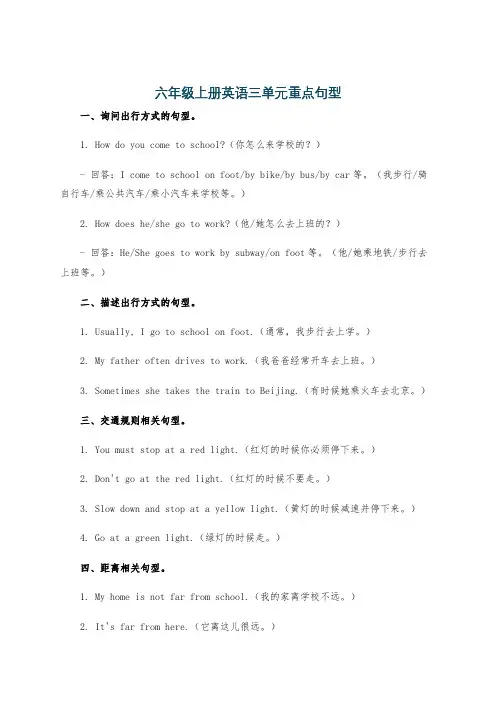
六年级上册英语三单元重点句型一、询问出行方式的句型。
1. How do you come to school?(你怎么来学校的?)- 回答:I come to school on foot/by bike/by bus/by car等。
(我步行/骑自行车/乘公共汽车/乘小汽车来学校等。
)2. How does he/she go to work?(他/她怎么去上班的?)- 回答:He/She goes to work by subway/on foot等。
(他/她乘地铁/步行去上班等。
)二、描述出行方式的句型。
1. Usually, I go to school on foot.(通常,我步行去上学。
)2. My father often drives to work.(我爸爸经常开车去上班。
)3. Sometimes she takes the train to Beijing.(有时候她乘火车去北京。
)三、交通规则相关句型。
1. You must stop at a red light.(红灯的时候你必须停下来。
)2. Don't go at the red light.(红灯的时候不要走。
)3. Slow down and stop at a yellow light.(黄灯的时候减速并停下来。
)4. Go at a green light.(绿灯的时候走。
)四、距离相关句型。
1. My home is not far from school.(我的家离学校不远。
)2. It's far from here.(它离这儿很远。
)- 可以接着说:We can go by bus/We should take a taxi等(我们可以乘公共汽车去/我们应该乘出租车等)。
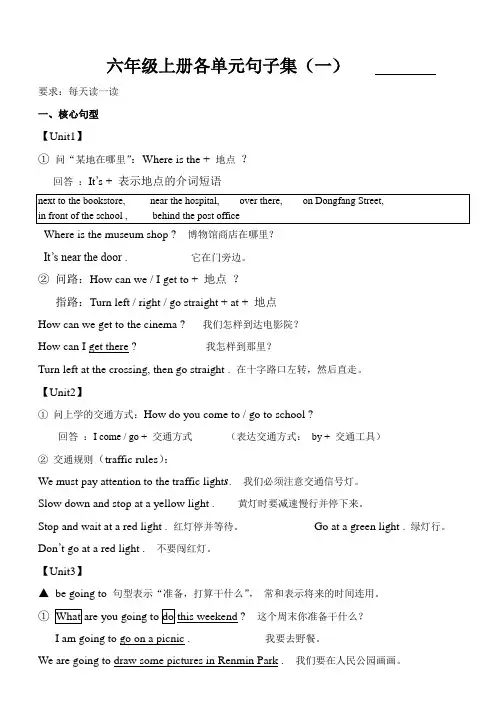
六年级上册各单元句子集(一)要求:每天读一读一、核心句型【Unit1】①问“某地在哪里”:Where is the + 地点?回答:It’s + 表示地点的介词短语Where is the museum shop ? 博物馆商店在哪里?It’s near the door .它在门旁边。
②问路:How can we / I get to + 地点?指路:Turn left / right / go straight + at + 地点How can we get to the cinema ? 我们怎样到达电影院?How can I get there ? 我怎样到那里?Turn left at the crossing, then go straight . 在十字路口左转,然后直走。
【Unit2】①问上学的交通方式:How do you come to / go to school ?回答:I come / go + 交通方式(表达交通方式:by + 交通工具)②交通规则(traffic rules):We must pay attention to the traffic light s. 我们必须注意交通信号灯。
Slow down and stop at a yellow light . 黄灯时要减速慢行并停下来。
Stop and wait at a red light . 红灯停并等待。
Go at a green light .绿灯行。
Don’t go at a red light . 不要闯红灯。
【Unit3】▲be going to 句型表示“准备,打算干什么”,常和表示将来的时间连用。
①What are you going to do this weekend ? 这个周末你准备干什么?I am going to go on a picnic . 我要去野餐。
We are going to draw some pictures in Renmin Park . 我们要在人民公园画画。
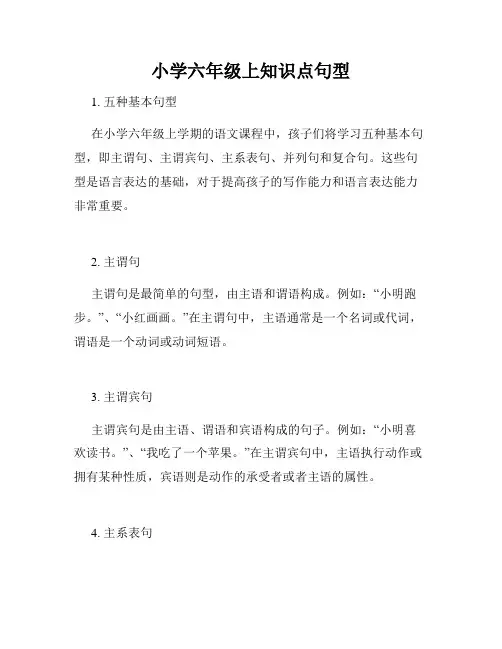
小学六年级上知识点句型1. 五种基本句型在小学六年级上学期的语文课程中,孩子们将学习五种基本句型,即主谓句、主谓宾句、主系表句、并列句和复合句。
这些句型是语言表达的基础,对于提高孩子的写作能力和语言表达能力非常重要。
2. 主谓句主谓句是最简单的句型,由主语和谓语构成。
例如:“小明跑步。
”、“小红画画。
”在主谓句中,主语通常是一个名词或代词,谓语是一个动词或动词短语。
3. 主谓宾句主谓宾句是由主语、谓语和宾语构成的句子。
例如:“小明喜欢读书。
”、“我吃了一个苹果。
”在主谓宾句中,主语执行动作或拥有某种性质,宾语则是动作的承受者或者主语的属性。
4. 主系表句主系表句是由主语、系动词和表语构成的句子。
例如:“花朵变得美丽。
” 在主系表句中,系动词是连接主语和表语的词语,表达状态、特征或身份变化。
5. 并列句并列句由两个或多个同级的分句构成,每个分句之间使用逗号或者连接词连接。
例如:“小明喜欢读书,小红喜欢画画。
”、“我骑自行车去公园,妹妹则选择步行。
”并列句可以使句子更加丰富多样,增强句子之间的逻辑关系。
6. 复合句复合句由一个主句和一个或多个从句构成。
从句可以是名词性从句、定语从句或者状语从句。
例如:“我喜欢花朵的颜色。
”、“小明帮助了一个需要帮助的人。
”复合句可以使句子更加复杂,表达更加具体的信息。
7. 句子变换在写作中,为了使句子更加丰富多样,我们可以通过句子变换来改变句型。
例如,将一个主谓句改为主谓宾句,或者将一个简单句变为并列句等等。
句子变换可以提高文章的表达力和吸引力。
8. 总结小学六年级上学期的语文课程重点学习了五种基本句型,即主谓句、主谓宾句、主系表句、并列句和复合句。
通过学习和掌握这些句型,学生们可以更好地提高语言表达能力和写作能力。
句子变换也是提高句子丰富度的好方法,孩子们可以尝试在写作中运用不同的句型,使文章更有特色和吸引力。
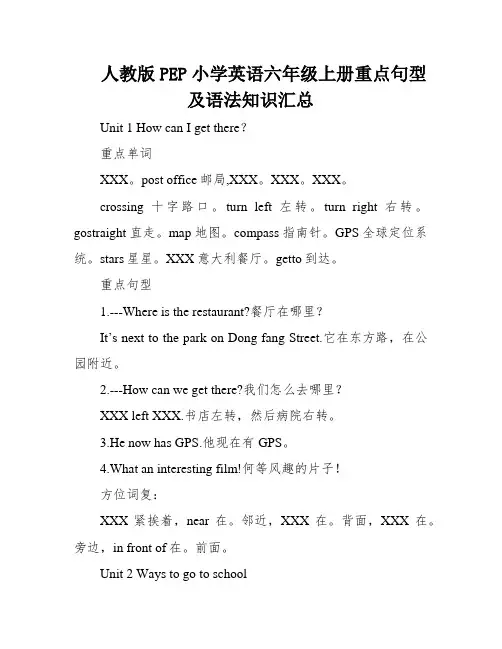
人教版PEP小学英语六年级上册重点句型及语法知识汇总Unit 1 How can I get there?重点单词XXX。
post office邮局,XXX。
XXX。
XXX。
crossing十字路口。
turn left左转。
turn right右转。
gostraight直走。
map地图。
compass指南针。
GPS全球定位系统。
stars星星。
XXX意大利餐厅。
getto到达。
重点句型1.---Where is the restaurant?餐厅在哪里?It’s next to the park on Dong fang Street.它在东方路,在公园附近。
2.---How can we get there?我们怎么去哪里?XXX left XXX.书店左转,然后病院右转。
3.He now has GPS.他现在有GPS。
4.What an interesting film!何等风趣的片子!方位词复:XXX紧挨着,near在。
邻近,XXX在。
背面,XXX在。
旁边,in front of在。
前面。
Unit 2 Ways to go to school重点单词on foot走路。
by bike骑车。
by bus乘公交。
by train乘火车。
XXX乘地铁。
by ship搭船。
by XXX乘飞机。
slow down 慢下来。
XXX交通灯。
traffic rules交通划定规矩。
go/come to school上学。
by sled坐雪橇。
byferry坐轮渡。
pay n to留意。
traffic lights交通灯。
and wait at a red light红灯停等一等。
slow downand。
at a yellow light黄灯减速并停下。
Go XXX。
重点句型1.---How do you come to school?你怎么上学?----Usually。
I come on foot.通常我走路来的。
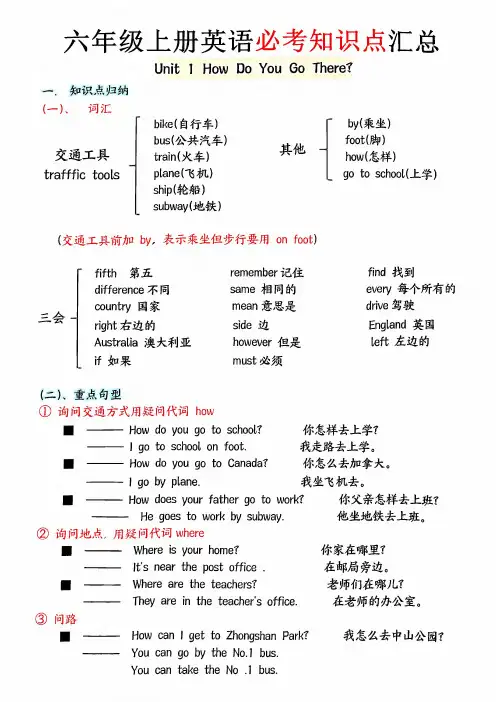
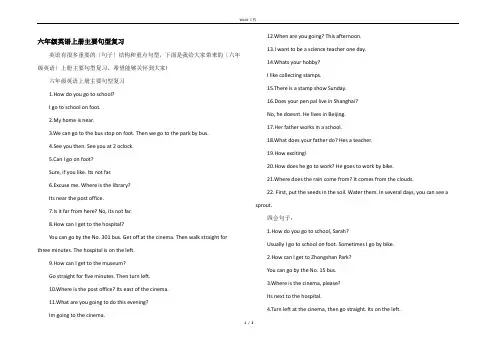
六年级英语上册主要句型复习英语有很多重要的〔句子〕结构和重点句型,下面是我给大家带来的〔六年级英语〕上册主要句型复习,希望能够关怀到大家!六年级英语上册主要句型复习1.How do you go to school?I go to school on foot.2.My home is near.3.We can go to the bus stop on foot. Then we go to the park by bus.4.See you then. See you at 2 oclock.5.Can I go on foot?Sure, if you like. Its not far.6.Excuse me. Where is the library?Its near the post office.7.Is it far from here? No, its not far.8.How can I get to the hospital?You can go by the No. 301 bus. Get off at the cinema. Then walk straight for three minutes. The hospital is on the left.9.How can I get to the museum?Go straight for five minutes. Then turn left.10.Where is the post office? Its east of the cinema.11.What are you going to do this evening?Im going to the cinema.12.When are you going? This afternoon.13.I want to be a science teacher one day.14.Whats your hobby?I like collecting stamps.15.There is a stamp show Sunday.16.Does your pen pal live in Shanghai?No, he doesnt. He lives in Beijing.17.Her father works in a school.18.What does your father do? Hes a teacher.19.How exciting!20.How does he go to work? He goes to work by bike.21.Where does the rain come from? It comes from the clouds.22. First, put the seeds in the soil. Water them. In several days, you can see a sprout.四会句子:1.How do you go to school, Sarah?Usually I go to school on foot. Sometimes I go by bike.2.How can I get to Zhongshan Park?You can go by the No. 15 bus.3.Where is the cinema, please?Its next to the hospital.4.Turn left at the cinema, then go straight. Its on the left.5.What are you going to do on the weekend? Im going to visit my grandparents this weekend.6.Where are you going this afternoon?Im going to the bookstore.7.What are you going to buy?I am going to buy a comic book.8. Whats your hobby?I like collecting stamps. .xkb1 .co m9.He likes collecting stamps, too.10.Does she teach English?Yes, she does. / No, she doesnt.11.What does your mother do?She is a TV reporter.12.Where does she work?13.How does she go to work?14.Where does the rain come from?It comes from the clouds.15.How do you do that?16.What should you do then?。
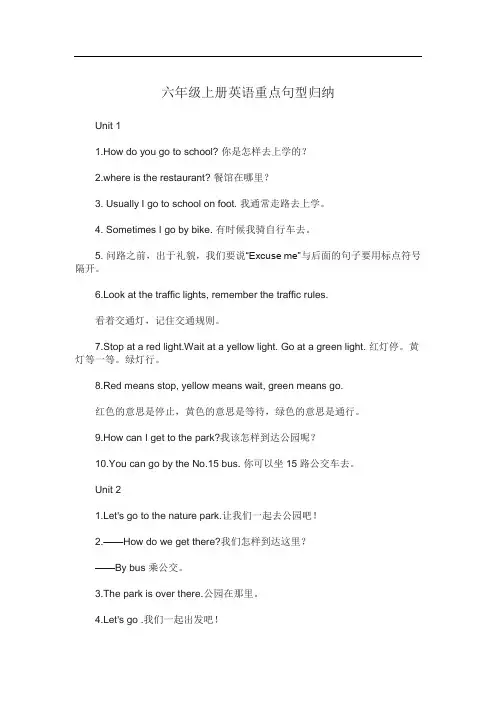
六年级上册英语重点句型归纳Unit 11.How do you go to school? 你是怎样去上学的?2.where is the restaurant? 餐馆在哪里?3. Usually I go to school on foot. 我通常走路去上学。
4. Sometimes I go by bike. 有时候我骑自行车去。
5. 问路之前,出于礼貌,我们要说“Excuse me”与后面的句子要用标点符号隔开。
6.Look at the traffic lights, remember the traffic rules.看着交通灯,记住交通规则。
7.Stop at a red light.Wait at a yellow light. Go at a green light. 红灯停。
黄灯等一等。
绿灯行。
8.Red means stop, yellow means wait, green means go.红色的意思是停止,黄色的意思是等待,绿色的意思是通行。
9.How can I get to the park?我该怎样到达公园呢?10.You can go by the No.15 bus. 你可以坐15 路公交车去。
Unit 21.Let's go to the nature park.让我们一起去公园吧!2.——How do we get there?我们怎样到达这里?——By bus 乘公交。
3.The park is over there.公园在那里。
4.Let's go .我们一起出发吧!5.Slow down and stop at a yellow light.黄灯等一等。
6.Stop and wait at a red light.红灯停。
Go at a green light.绿灯行。
Unit 31.---What are you going to do tomorrow?---I'm going to have an art lesson.此句是个一般将来时态的特殊疑问句。
六年级上册英语固定句型知识点总结归纳一、日常交际用语1. 问候Good morning/afternoon/evening. Hi/Hello, [name].How are you?Fine, thank you. And you?2. 告别Goodbye/Bye.See you later.Have a good day!3. 感谢与应答Thank you.You're welcome.Thanks a lot.Don't mention it.4. 道歉与应答I'm sorry.That's OK.It doesn't matter.5. 请求帮助Can you help me, please?Sure, what do you need?6. 表达意愿I'd like to...I want to...二、基本句型结构1. 陈述句肯定句:I like apples.否定句:I don't like apples.2. 一般疑问句Do you like apples?Yes, I do. / No, I don't.3. 特殊疑问句What do you like?I like apples.4. 祈使句Please close the door.Don't forget your homework.5. There be句型There is a book on the table. There are two apples in the basket.三、重点固定句型1. 询问姓名What's your name?My name is [name].2. 询问年龄How old are you?I'm [age] years old.3. 询问职业What do you do?I'm a [occupation].4. 询问爱好What are your hobbies?I like [hobby].5. 询问地点Where is [place]?It's near [another place].6. 询问时间What time is it?It's [time].7. 询问数量How many [nouns] are there? There are [number] [nouns].8. 询问价格How much is it?It's [price].9. 询问颜色What color is it?It's [color].10. 询问食物和饮料What would you like to eat/drink? I'd like [food/drink].11. 询问做某事的能力Can you [verb]?Yes, I can. / No, I can't.12. 询问周末活动What do you do on the weekend?I usually [activity].13. 谈论日常活动What do you do in the morning?I usually [activity].14. 谈论喜欢的科目What's your favorite subject?My favorite subject is [subject]. 15. 谈论天气What's the weather like today?It's [weather condition].16. 提出建议Let's [verb].That sounds good.17. 谈论过去的事件Did you [verb] last weekend?Yes, I did. / No, I didn't.18. 谈论未来的计划Are you going to [verb] this weekend? Yes, I am. / No, I'm not.四、例句1. 询问姓名与回答—What's your name?—My name is Alice.2. 询问年龄与回答—How old are you?—I'm ten years old.3. 询问职业与回答—What do you do?—I'm a teacher.4. 询问爱好与回答—What are your hobbies?—I like reading books.5. 询问地点与回答—Where is the park?—It's near my house.6. 询问时间与回答—What time is it?—It's 8:30.77. 询问数量与回答—How many apples do you have?—I have five apples.8. 询问价格与回答—How much is this book?—It's twenty dollars.9. 询问颜色与回答—What color is your car?—It's blue.10. 询问食物与饮料喜好与回答—What would you like to eat?—I'd like a hamburger and fries.11. 询问做某事的能力与回答—Can you play the piano?—Yes, I can. I've been learning for years.12. 询问周末活动与回答—What do you do on the weekend?—I usually go hiking with my family.13. 谈论日常活动与回答—What do you do in the morning?—I usually brush my teeth, eat breakfast, and then go to school.14. 谈论喜欢的科目与回答—What's your favorite subject?—My favorite subject is science. I love experiments!15. 谈论天气与回答—What's the weather like today?—It's sunny and warm. Perfect for a picnic!16. 提出建议与回应—Let's go to the movies this weekend.—That sounds like a great idea! I'll bring the popcorn.17. 谈论过去的事件与回答—Did you visit your grandparents last weekend?—Yes, we did. We had a great time!18. 谈论未来的计划与回答—Are you going to learn a new language this year?—Yes, I am. I'm thinking about learning Spanish.五、其他常用句型1. 表达感谢Thank you for [something].You're welcome.2. 道歉与回应I'm sorry for [apologizing for something].It's OKAY. / Don't worry about it.3. 表达喜好I like [noun/activity].Me too! / I like it too.4. 表达不喜欢I don't like [noun/activity].Oh, really? What do you like instead?5. 表达惊讶Wow! That's amazing!Thanks. I'm glad you think so.6. 表达同意与不同意I agree with you.I disagree. I think [your opinion] is wrong.六、总结以上是关于六年级上册英语的主要固定句型知识点总结归纳,涵盖了询问信息、表达个人喜好、谈论日常生活、提出建议、谈论未来计划等多个方面。
六年级英语上册《重点句型》整理学习必备1. ---Where is the restaurant?餐厅在哪里?----It’s next to the park on Dong fang Street.它在东方路,在公园附近。
2.---How can we get there?我们怎么去哪里?----Turn left at the bookstore. Then turn right at the hospital.书店左转,然后医院右转。
3.---How do you come to school?你怎么上学?----Usually, I come on foot.通常我走路来的。
4.---How can I get to the Fuxing Hospital? 我怎么能到达复兴医院?----Take the No.57 bus over there.你可以在那边乘57路公交车。
5.You must pay attention to the traffic lights.你必须注意交通信号灯。
6.---What are you going to do tomorrow? 你明天打算做什么?----I’m going to have an art lesson.我要上美术课。
7. ---What are you going to buy?你要买什么?----I’m going to buy some word books. 我要买一些单词书。
8.---Where are you going?你们打算去哪儿?----We are going to the cinema.我们打算去电影院。
9.---When are you going?你们什么时候去?----Next Wednesday. 下周三。
10.---Do you have comic books?你有漫画书吗?----Yes,here they are.有,在这里。
六年级上册重点句型
1、What time is it? 现在是几点?
2、What’s the date today? 今天是几号?
3、It’s the middle of winter. 现在是冬天中间。
4、When’s your birthday? 你的生日是什么时候?
5、My birthday’s in June. 我的生日在六月。
6、It’s hot in summer. 夏天很热。
7、It’s cold in winter. 冬天很冷。
8、We often go swimming in summer. 夏天我们经常去游泳。
9、We often go skating in winter. 冬天我们经常去滑冰。
10、What do you do on Thursdays? 你星期四做什么?
11、I play football on Mondays. 我星期一踢足球。
12、What do you have on Thursdays? 你星期四有什么课?
13、We have English, maths and science on Thursdays. 我们星期四有英语、数学和科学课。
14、What’s your favourite season? 你最喜欢的季节是什么?
15、My favourite season is autumn. 我最喜欢的季节是秋天。
16、Why do you like autumn? 你为什么喜欢秋天?
17、Because it’s the golden season. 因为它是黄金季节。
最新湘少版六年级语文上册重点句型汇总
(全册)
第一单元:秦汉风采
- 句型1:在句子中用作状语的不定式,表示目的或理由。
- 例句:他们努力研究,为的是考取好的大学。
- 句型2:在句子中用作状语的介词短语,表示方式或程度。
- 例句:小明跑得飞快,像一只奔驰的猎豹。
第二单元:山水挽歌
- 句型1:主语+动词+宾语+宾语补足语
- 例句:我看见他变得更加自信了。
- 句型2:主语+动词+间接宾语+直接宾语
- 例句:老师给我们讲了一些有趣的故事。
第三单元:小小诗人
- 句型1:状语从句,表示时间、地点、条件、原因等。
- 例句:妈妈告诉我,只要努力,就一定能成功。
- 句型2:省略句型,主谓或主谓宾省略其中一个。
- 例句:老师教育我们,踏实做事。
第四单元:古人云
- 句型1:主语+系动词+表语
- 例句:他们都很高兴。
- 句型2:主语+动词+宾语+宾语补足语
- 例句:她把房间布置得很漂亮。
第五单元:浪漫童年
- 句型1:感叹句型,表示惊讶、赞叹等情绪。
- 例句:多么美丽的花园啊!
- 句型2:主语+动词+宾语+宾语补足语
- 例句:我们把小鸟喂得饱饱的。
第六单元:个体与个体
- 句型1:主语+动词+宾语+宾语补足语
- 例句:他称赞他的弟弟变得更聪明了。
- 句型2:状语从句,表示时间、地点、方式等。
- 例句:妈妈告诉我,只要执着努力,就一定能成功。
以上是最新湘少版六年级语文上册的重点句型汇总,按照单元划分,内容简明扼要。
六年级上册Unit 1重点句型和知识点一、知识点:1. 专有名词首字母要大写: 新华书店---X inhua B ookstore 淘金书店---T aojin B ookstore第一人民医院---the No.1 People ’s Hospital 儿童医院---the C hildren ’s H ospital嘉信电影院----J inxin C inema 顺德图书馆—S hunde L ibrary 顺峰公园----S hunfeng P ark 顺德博物馆---- S hunde M useum 故宫博物馆----P alace M useum 东方街---- D ongfang S treet2.附近、旁边:near = beside = next to =close to3. can, let,to,do, help +动词原形:①②③④They don ’ ⑤4.①see a doctor 看医生 see a film 看电影 see a show 看展览、表演 看 ②watch TV 看电视 watch cartoon 看卡通 watch a football game/match 看足球比赛 ③read a book 看书 read a magazine 看杂志 read a story 读故事 read a poem 读诗歌5. want 想,①want to+动词原形 ②want+名词 I want I want6. far from 离......远 Is it here ?7.at+ 钟点/’clock ②8. 在左边/右边on 在某街道9.in 表示在某一范围内,表示时间:in+10.help 帮助(动词+宾格),帮助某人(宾格me 我 us 我们 you 你、你们 her 她 him 他 them 他们 it 它)(动词+宾格) (★不是动词+宾格,而且动词+名词)11.let 让(动词+宾格),让某人, --------★动词后面注意是否+宾格Let ’ 12.dont ’ 不我们不喜欢红色。
英语六年级上册重点句型1. What's your name?2. How old are you?3. Where do you live?4. Have you been to Beijing?5. What do you like to do in your free time?6. Can you speak English?7. What's this in English?8. What time do you get up in the morning?9. How many brothers and sisters do you have?10. Do you like playing football?11. I have two dogs and three cats.12. There are twelve months in a year.13. She has a beautiful dress.14. My father drives a car to work.15. They go to school by bus every day.16. He likes watching TV after dinner.17. We play basketball on the weekends.18. My mother cooks delicious meals.19. The students study hard for the exam.20. The teacher explains the lesson clearly.21. The cat is sleeping on the chair.22. She is reading a book in the library.23. The boys are playing soccer in the park.24. We are going to the museum tomorrow.25. I am drawing a picture for my friend.26. The birds are singing in the trees.27. They are swimming in the pool.28. The girls are dancing on the stage.29. My grandparents are visiting us this weekend.30. The children are playing hide and seek.31. We are having a party at my house.32. She is baking a cake for the party.33. The ants are carrying food to their nest.34. The monkeys are swinging in the trees.35. The fish are swimming in the pond.36. He is playing the piano in the living room.37. They are skateboarding in the park.38. She is rollerblading in the street.39. He is riding a bike to the store.40. The girls are skipping rope in the playground.41. The dog is chasing a ball in the yard.42. My brother is climbing a tree in the backyard.43. The children are planting flowers in the garden.44. She is watering the plants on the balcony.45. The baby is crawling on the floor.46. The children are building a sand castle on the beach.47. He is flying a kite in the park.48. They are playing with a frisbee in the field.49. The girl is jumping on the trampoline.50. The boy is playing with a yo-yo in the classroom.51. She is hula hooping in the backyard.。
六年级上册重点句型
1 How do you go to school?
I go to school by bike.
2 How do you go to Canada?
I go by plane.
3 How does she \ he go to work?
She \ He goes to work by subway.
4 Stop at a red light.
Wait at a yellow light.
Go at a green light.
5 How can I get to Zhongshan Park?
You can go by the No.15 bus.
6 Where is the cinema, please?
It’s next to the hospital.
7 How can I get to the museum?
Go straight for five minutes, turn left at the cinema. It’s on the left.
8 What’s your hobby?
I like collecting stamps.
9 What’s his \ her hobby?
He \ She likes collecting stamps, too.
10 What’s their hobbies?
They like riding a bike.
11 Does your pen pal live in HongKong?
Yes, he does.\No, he doesn’t. He lives in London.
12 Does she teach you math?
Yes, she does.\ No, she doesn’t.
13 Does Amy read newspapers everyday?
Yes, she does.\ No, she doesn’t.
14 W hat’s does your father\ mother do?
He’s \ She’s a singer.
15 Who’s she ?
She’s my aunt.
16 Where does she work?
She works in a car factory.
17 How does she go to work?
S he goes to work by bus.
18 Where does the rain come from?
It comes from the clouds.
19 How can the water become vapour?
T he sun shines and the water becomes vapour.
20 What are you going to do this afternoon?
I’m going to plant flower seeds in our garden.
21 How do you do that?
First , put the seeds in the soil.
22 What should you do then?
Water them.
一般将来时的句型
1Where are you going?
I’m going to the bookstore.
2What are you going to do?
I’m going to buy a magazine.
3When are you going?
I’m going this afternoon.
4Who are you going with?
I’m going with my younger brother. 5How are you going?
I’m going by taxi.
6Where is she\he going?
She’s \He’s going to the fruit stand. 7What is she\he going to do?
She’s \He’s going to buy some friuts.。